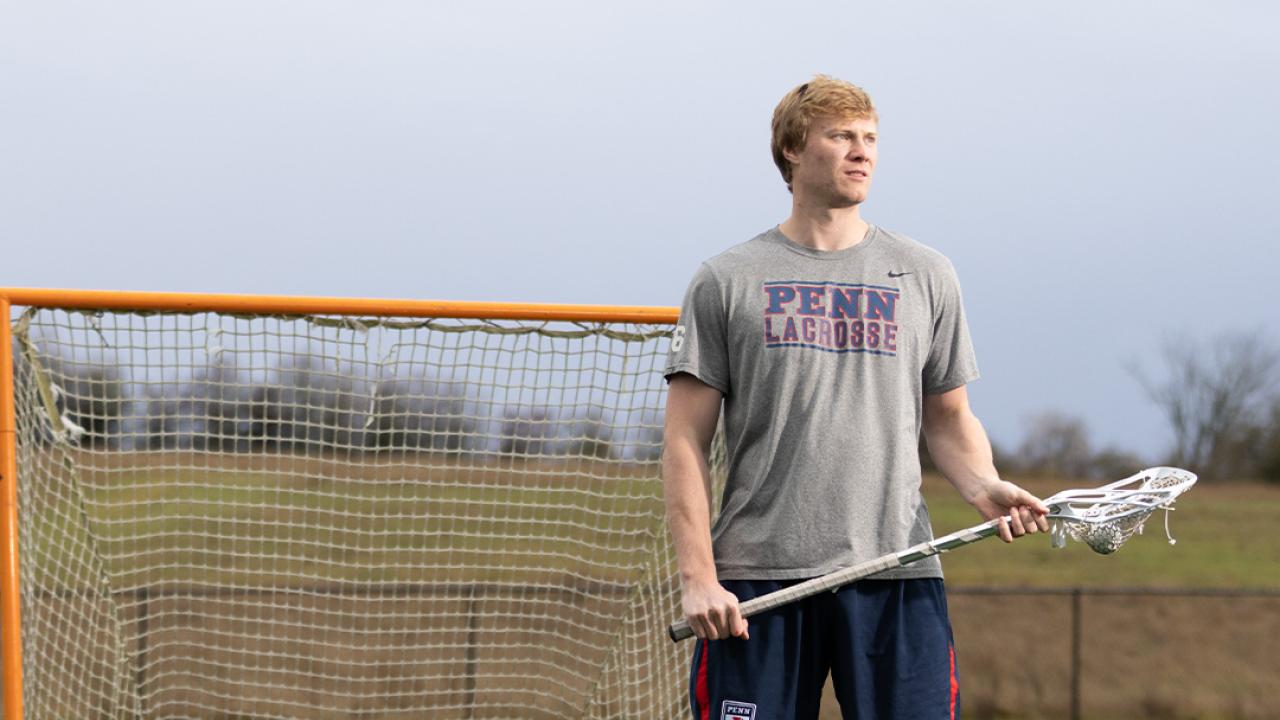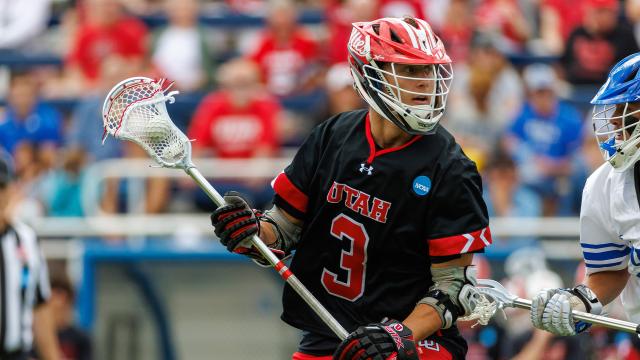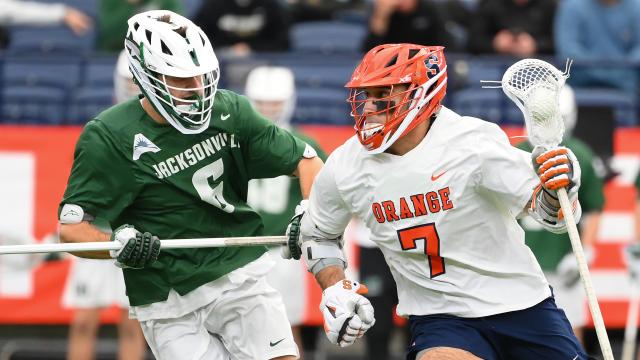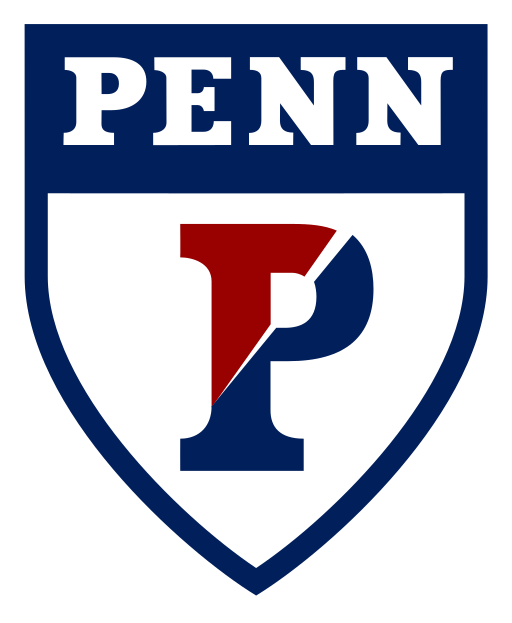
Rip City Ringer: Sam Handley Prepared for This Moment
Sam Handley was dying. And to make matters worse, his team hadn’t even won the game.
Despite a heroic effort from Handley, the star midfielder who recorded five points with broken ribs and what he later learned was a ruptured spleen, Penn blew a late lead and dropped the 2020 season opener at Maryland.
“He played an unbelievable game,” Quakers coach Mike Murphy said. “Credit to Maryland. They were clearly ready for him. Just an unfortunate injury."
Then he paused, before adding: “Injury seems like an understatement.”
Handley didn't feel right on the bus ride back to Philadelphia. The pain in his side was excruciating. He told Murphy, took some Ibuprofen and figured he'd feel better in the morning. Maybe this was just his body reacting to the first game of his sophomore season, against a physical team that targeted him specifically in its game plan.
Then again, Handley is a bruising 6-foot-5, 230-pound freight train of a player. He’s not usually the one gutting out a painful bus ride home.
“It’s physics,” Handley said. “Momentum equals mass times velocity. I’m moving pretty fast and I’m just a big dude. If your momentum is higher than the guy you’re colliding with, you’re usually able to withstand it.”
That 2020 opener came on the heels of a freshman season in which Handley etched his name into Penn’s record book. His rookie year was something special. He racked up 61 points (35 goals, 26 assists), earning first-team All-American and Ivy League Rookie of the Year honors. It had long been impossible to miss the massive Handley on the field. Suddenly people were noticing the lightly recruited former attackman from Portland, Oregon, on the stat sheet, too.
“If he gets a running start on his defender, it's like an 18-wheeler going downhill," ESPN analyst Paul Carcaterra said.
That’s a more poetic way of saying what Josh Hunt, Handley’s long-time strength and conditioning coach, said about him. “He’s a menace,” Hunt said. “He’s a monster.”
Even monsters bleed if you prick them.
Or in Handley’s case, break their ribs. They still don't know for sure what play caused the injury. Maybe it happened when Handley had his hands up while an opponent slid to him. One of those moments that happens a hundred times a game.
He came off the field for a few minutes. Everything seemed alright. The ball was in his stick during the waning moments of the game, which was suddenly out of reach.
Later that night, Handley met his parents for dinner. The pain was off the charts. His family rushed him to the hospital. His stomach was filled with blood. The broken ribs had ruptured his spleen. “I was straight up dying,” he said. “Shivering. Holding my stomach. Feeling awful. If I had gone to bed that night I definitely wouldn’t be here.”
The spleen makes and recycles blood cells. If it ruptures, blood will leak out in a phenomenon known as internal bleeding. Eventually there won’t be enough blood in the vascular system to maintain blood pressure. They had to split him open. There was so much blood the doctors could barely see what they were doing. The 10-inch scar down his abdomen is now a permanent reminder of the emergency surgery that saved his life.
“I’ve never had a player go through that,” Murphy said. “You see guys tear their ACLs, head injuries. But that one in particular, I’ve never been around anything like that.”
Aside from the fact that he’d die without one, a guy doesn’t really need his spleen to play lacrosse. If it happened a few weeks earlier, Handley doesn't think he’d have ended up missing any games. He couldn’t wait to get back on the field.
But this was 2020. Handley, and everyone else, was about to get very used to waiting.
HUNT MET HANDLEY WHEN HE WAS 15, a skinny teenager with outsized work ethic and some good genes. The coach could see the future.
“He always had a great mindset, but then you look at his parents and you saw what he was going to turn into eventually,” Hunt said of Lisa and J.B. Handley. “His mom is tall and athletic. His dad is barrel chested. He’s as thick as he is wide. His shoulders are twice as broad as a regular man. You knew something special was coming down the road.”
Handley loved sports, but he thought baseball was boring. He was sick of all the rain delays. His grandfather put a stick in his hand and his dad put a baseball rebounder in his backyard. Handley spent hours throwing a ball against it. Being the oldest of three, one of whom has special needs, taught Handley to be independent.
Handley was part of the early wave, a bygone era when coaches recruited middle-schoolers and kids were committing to college in ninth grade. He wasn’t on any Top 100 lists, but those who watched him play for Jersuit High School and 3d Lacrosse could see the potential.
Pat Myers, now the head coach at Lafayette, was Penn’s offensive coordinator back then. “You gotta see this kid from Oregon,” he told Murphy.
Handley was a three-time USA Lacrosse All-American and the Oregon High School Lacrosse Association Player of the Year as a senior. He was also all-conference in basketball.
Academically, physically and culturally, Penn was the perfect fit. There was only one problem. The Quakers didn’t really need an attackman. They converted him to midfield and put him on the second unit. That lasted two games. He scored three goals in his first start, a loss to Penn State, then exploded for four goals and three assists in a win over Villannova.
“By the time he entered the college game as a midfielder, he was faster, stronger and still had the quarterbacking skills with tremendous vision," Carcaterra said.
Penn won the Ivy League tournament that season, but it ended with an overtime heartbreaker aagainst Yale in the NCAA quarterfinals. Handley had just one assist and committed a turnover in overtime. Doubt started creeping in. Would that overshadow everything? He had to wait two years to answer that question.
HANDLEY RUPTURED HIS SPLEEN FEB. 14, 2020. Eleven days earlier, the World Health Organization had declared COVID-19 a public health emergency. Eleven days after the injury, the Centers for Disease Control was saying that COVID-19 had reached pandemic status. On March 11, just as Handley was starting to feel, in his words, “normal-ish,” the Ivy League canceled its spring season. Later that night, Tom Hanks tested positive for the coronavirus. The NBA suspended its season.
The world shut down.
Any chance Handley had to put the injury behind him and prove his freshman year was for real disappeared.
But at least Penn wasn’t the only team sitting at home. The 2021 season was a different story. The will-they-or-won’t-they dance the Ivy League did still hurts the Quakers, lingering like a scar, a painful memory as strong and jarring as a ruptured spleen. There would be no chance for Cornell or Princeton to prove their truncated undefeated campaigns the previous year were real. No chance for Yale to attempt a third straight trip to the NCAA final. And no chance for Handley to silence whatever doubters remained.
“I was angry,” Handley said. “For them to go back and forth and cancel it without forewarning. To do that in such a totalitarian way was disheartening.”
“For the Ivy League to make the decision they did with no explanation was really inexplicable,” Murphy added. “I still don’t understand it. It’s traumatic to a certain extent.”
Handley considered transferring. He credits Penn’s 2021 seniors, who had no reason to keep going, for holding the team together. When the Quakers finally returned to the field in 2022, they won the Ivy League championship. Each of those graduated seniors received a championship ring.
Handley had a big hand in getting them those rings. He racked up 73 points and became Penn’s first Tewaaraton Award finalist. The Quakers again reached the NCAA quarterfinals, and again they fell just short of the final four. Handley shot 0-for-7 and committed four turnovers but had three assists in an 11-9 loss to Rutgers.
Handley was the Ivy League Player of the Year and the USILA Midfielder of the Year. He was one of just nine collegiate players invited to try out for the 2023 U.S. men’s national team and one of five to make the training roster.
Asked how Handley did it after all that happened, Murphy laughed out loud.
“Because he’s really good,” Murphy said. “He could not play for five years. Just give him a month and he’d be an All-American lacrosse player. People like him don’t come along often. The 6-5 thing and 230 thing, you can fall back on that, but that’s not what makes him great. There are plenty of kids like that. His skillset and his understanding of the game are what make him unique.”
WITHOUT THE PANDEMIC, THE LOSS TO RUTGERS may have been Handley’s last game. For eligibility reasons, he spent this fall back home in Portland. He'd never had so much time on his hands. So he did what any bored Ivy Leaguer would do.
He researched starting his own business.
Handley, who has a 3.7 GPA, eats healthy and clean. He wanted to create a snack bar that was better for the body. He spent the fall researching everything from ingredients to packaging to store placement. If he finds the perfect flavor combination, his lacrosse renown could do the rest.
The story could reach a larger audience because Handley would run the company with his biggest inspiration, his younger brother, Jamison, who has autism. In the world of autism advocacy, Jamison is as much a celebrity as his big brother is in lacrosse.
“So humbling,” Handley said. “He would do anything to be in my position.”
Handley has spent more of his college career at home than anyone expected. In Portland, he trains with Hunt, who also works with Georgetown star Tucker Dordevic, and coaches youth players. “The pace of life is different,” he said. “In Philly, there’s that hurry-up, everything-is-important-right-now thing. Life’s a lot slower out here.”
“Humbling,” is the word Handley keeps coming back to. The awards. Training with the U.S. Lining up alongside players he grew up idolizing. “I never saw any of this coming,” he said.
Maybe he should have seen it coming. All the elements of an epic story were there. The young hero leaves home for a strange land. He immediately finds success with the help of some mentors and new friends. Then he has a setback. Nearly dies. Then another setback. And another. Let’s throw in a plague. Barriers go up, the road rerouted. But he keeps pushing. He keeps triumphing.
All that’s missing is an ending. Penn has not made the final four since 1988. Handley can rewrite that narrative.
“He’s faster than he’s ever been,” Hunt said. “Bigger. Stronger. He’s going to be even better than people thought.”
The lessons have been learned. The story is almost over. The pen — and Penn — is in Handley’s capable hands.
Mark Macyk
Related Articles




